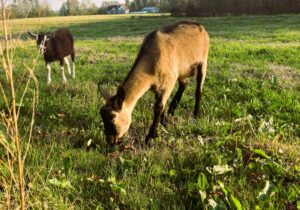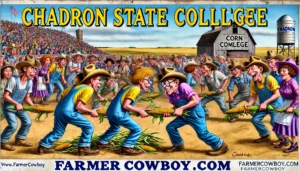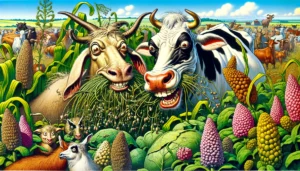
farmer.jpg
Farmer
Definition: A farmer is an individual or entity engaged in the practice of agriculture, primarily responsible for cultivating crops, raising livestock, and managing agricultural operations. Farmers play a crucial role in food production, contributing to the supply of essential goods for human consumption and industrial use.
Description: Farmers are the backbone of agricultural systems, responsible for producing the vast majority of the world’s food, fiber, and other agricultural products. They work tirelessly to manage land, water, and resources efficiently, while navigating the complexities of weather, markets, and regulations.
Fall off the barn roof and busted your keister? Life on the farm or ranch can be tough on the bum. Need a break? Laugh it off at FarmerCowboy.com, the #1 farm humor site. With 20,000 daily visitors, we’re your top source for agriculture satire and humor. Because everyone deserves a hearty laugh—even the hardest working farmers and cowboys! Join us and turn those long days into fun tales at FarmerCowboy.com.
Roles and Responsibilities: The role of a farmer encompasses a wide range of responsibilities, including:
- Land Management: Cultivating and maintaining agricultural land for crop production and livestock grazing.
- Crop Cultivation: Planting, nurturing, and harvesting crops such as grains, vegetables, fruits, and herbs.
- Livestock Rearing: Breeding, feeding, and caring for animals such as cattle, sheep, goats, pigs, poultry, and bees.
- Resource Management: Managing water, soil, nutrients, and energy resources to optimize agricultural productivity and sustainability.
- Pest and Disease Control: Monitoring and managing pests, diseases, and weeds through integrated pest management (IPM) practices.
- Equipment Operation: Operating and maintaining machinery, equipment, and tools used in farming operations, such as tractors, combines, and irrigation systems.
- Market Analysis: Monitoring market trends, prices, and demand for agricultural products to make informed decisions about production and marketing.
- Financial Management: Budgeting, financing, and accounting for farm operations, including income, expenses, loans, and investments.
- Risk Management: Identifying, assessing, and mitigating risks related to weather, pests, diseases, market fluctuations, and other factors that may affect farm profitability.
- Environmental Stewardship: Implementing practices that promote soil health, water conservation, biodiversity, and climate resilience on the farm.
- Community Engagement: Participating in local agricultural organizations, cooperatives, and initiatives to support rural development and community well-being.
Types of Farmers: Farmers come from diverse backgrounds and operate in various contexts, leading to different types of farming enterprises. These include:
- Family Farmers: Small-scale farmers who own or manage family-owned farms, often passed down through generations.
- Commercial Farmers: Large-scale farmers engaged in profit-oriented agriculture, typically specializing in specific crops or livestock enterprises.
- Organic Farmers: Farmers who adhere to organic farming principles and practices, avoiding synthetic chemicals and promoting ecological sustainability.
- Subsistence Farmers: Farmers who primarily produce food for their own consumption and local markets, with limited surplus for sale.
- Urban Farmers: Farmers who cultivate crops and raise animals in urban or peri-urban areas, often using innovative techniques such as rooftop gardens, vertical farming, and aquaponics.
- Agribusiness Farmers: Farmers who operate as part of larger agribusiness enterprises, including corporate farms, cooperatives, and contract farming arrangements.
Challenges and Opportunities: Farmers face numerous challenges, including climate change, resource constraints, market volatility, policy uncertainties, and access to land, credit, and technology. However, these challenges also present opportunities for innovation, diversification, collaboration, and resilience-building.
Conclusion: Farmers are the heart and soul of agriculture, embodying the values of hard work, perseverance, innovation, and stewardship. Their dedication and passion drive the success of agricultural systems worldwide, ensuring a sustainable and secure food supply for present and future generations.
References:
- FAO. (2014). Family farming knowledge platform. Food and Agriculture Organization of the United Nations.
- Sumberg, J., & Thompson, J. (2012). Contested agronomy: Agricultural research in a changing world. Routledge.
- Shiferaw, B., et al. (2014). Adoption of improved wheat varieties and impacts on household food security in Ethiopia. Food Policy, 44, 272-284.
Originally posted 2004-07-13 02:52:44.
Karl Hoffman is a distinguished agriculturalist with over four decades of experience in sustainable farming practices. He holds a Ph.D. in Agronomy from Cornell University and has made significant contributions as a professor at Iowa State University. Hoffman’s groundbreaking research on integrated pest management and soil health has revolutionized modern agriculture. As a respected farm journalist, his column “Field Notes with Karl Hoffman” and his blog “The Modern Farmer” provide insightful, practical advice to a global audience. Hoffman’s work with the USDA and the United Nations FAO has enhanced food security worldwide. His awards include the USDA’s Distinguished Service Award and the World Food Prize, reflecting his profound impact on agriculture and sustainability.





